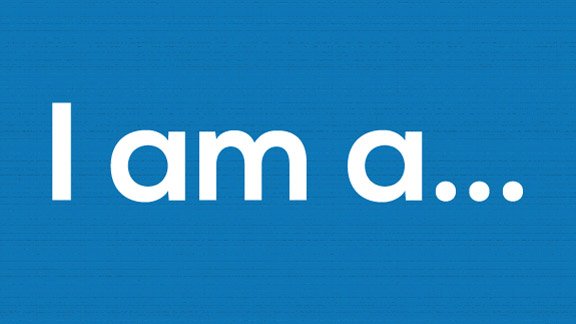I am a human.
I am a man.
I am a woman.
I am an atheist.
I am a theist.
I am a... Christian... Muslim... Jew... etc.
I am etc.

I am a... You are a ... They are a ...
These terms can help to provide a quick reference to aspects of ourselves. But they can also be used to constrict and restrict an accurate understanding about ourselves. We can get sucked into these descriptive identification labels. They can bind our consciousness into a box where we live according to the definition of these descriptive labels.
We need to be mindful that just because someone doesn't believe the existence of something, doesn't mean they deny it either. Those who do believe in something, doesn't mean they belong to the same descriptive label as others who believe in something. Someone can believe in "God", yet that doesn't make them a Christian, they could be Muslim. Someone can not believe in "God", but that doesn't make them atheist either, they can simply acknowledge they don't know as an agnostic.
It's easy to hear someone describe themselves and immediately apply a label to their psychological framework. But that's only accurate if they adopt that descriptive label to define themselves. Then they adopt the ideas that the label construct puts forth. If one doesn't adopt a particular ideology or philosophy, one can share characteristics, properties, attributes, qualities or aspects of many other ideological constructs that have descriptive labels associated with them.
Sometimes a word can easily describe a simple part of us, like being human, etc., as well as more complex psychological aspects of ourselves. At other times a word might appear to reflect someone's psychological constructs from an outside view, but that word is only used as a quick reference from analogy or correspondence in order for us to attempt to understand more of what the person thinks. This can lead to false assumptions through the fallacy of blind correspondence as I call it. Just because a property of a philosophical construct, ideology, or belief is shared by someone, doesn't mean they ascribe or identify with that specific criteria.
I tend to stay away from identifying myself as being from ideological constructs or philosophical frameworks. Take the knowledge therein, don't just take everything -- nor at face value simply out of the mesmerizing effect of finding some truth in it somewhere and then blindly having faith, trust, loyalty and belief in it from buying into the belief being sold.
When we take certain ideological constructs into ourselves, we identify with them and merge them with parts of ourselves. We then identify with the descriptive labels that classify us according to someone else's definition. Identification with an idea or group can have us defend them group and ideas as if it were ourselves, even when the idea or group is wrong. We confine ourselves to prescribed definitions.
Sure descriptors help in general to communicate and understand more quickly, but we can get carried way too. Many who choose to identify with certain things don't see the flaws within that are based on incompatibility with principles of truth or moral truth. Many of us have -- and still do -- get carried away and become those descriptions and let them define who we are, keeping us locked into some state. But beyond those boxes there is potential for more, possibly more improvement and betterment that those boxes don't let us think outside of.
The ideas that have value and merit to be followed will stand on their own. The name or word given to them is for convenience. Don't get sucked into the group identification that can form around an idea, as it can limit our potential to excel beyond it.
Group-think, social conformity and the desire for attention and to belong can get us sucked into groups and ideas. Beware the power of consciousness ;)
